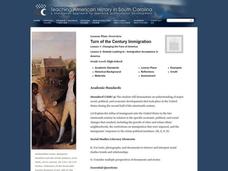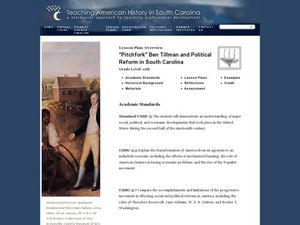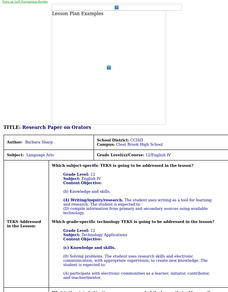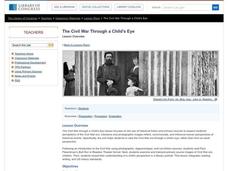Curated OER
“Will I or Won’t I?” Colonel Robert Gould Shaw, 54th Massachusetts Regiment
High schoolers discover the story of the 54th Massachusetts Regiment. In this American Civil War lesson, students study the life of Robert Gould Shaw and the regiment he led. High schoolers research primary and secondary sources to learn...
Curated OER
Kensington Mansion: Plantation, Sharecroppers, Tenants
Eleventh graders investigate the significance of the Kensington Mansion. In this South Carolina history lesson plan, 11th graders take field trips to the mansion and research primary and secondary sources about plantations,...
Curated OER
Turn of the Century Immigration
Students explore the immigration wave that hit the United States in 19th century. In this immigration lesson, students examine primary and secondary sources to determine what the immigration experience was like for new citizens. Students...
Curated OER
"Pitchfork" Ben Tillman and Political Reform in South Carolina
Eleventh graders examine the political reform movement in South Carolina spearheaded by "Pitchfork" Ben Tillman. In this South Carolina history lesson, 11th graders examine primary and secondary sources regarding Tillman...
Curated OER
Site and Situation: Right Place at the Right Time
Young scholars put their geography skills to work. In this geography skills lesson, students research maps and other primary and secondary sources to simulate the site selection process for the Pennsylvania Railroad Shops post World War...
Curated OER
Critically Examining, Analyzing and Evaluating Picture Books on Aboriginal Canada
Students combat pervasive stereotypes. In this Critical Analysis lesson, students examine and evaluate the stereotypes of Aboriginal groups, as depicted in a picture book. Students will use primary and secondary sources to compose...
Facing History and Ourselves
What Makes Memphis a Community?
Sixth graders explore the community identity of Memphis, Tennessee. After examining primary and secondary sources, class members describe the city and its attributes that make it a unique community.
Curated OER
The Grapes of Wrath: Scrapbooks and Artifacts
Learners interpret historical evidence presented in primary and secondary sources. In this Great Depression activity, students read John Steinbeck's The Grapes of Wrath and use ethnographic research...
Curated OER
Cultural Inquiry Lesson 2B: Finding Artifacts and Analysis
Students build on their knowledge of sources, by looking at 2 types of information sources: artifacts or primary sources and analysis or secondary sources. They brainstorm a list of primary and secondary sources connected to one of...
Curated OER
From Smithson To Smithsonian, The Birth Of An Institution
Students evaluate historical sources. In groups, students explore the differences between a primary and secondary source. They examine the importance of evaluating sources and using credible ones when writing reports. Students...
Curated OER
A Hoosier Perspective on the March to the Sea: The Diary of William Miller
Eighth graders take a closer look at Sherman's March to the Sea. In this American Civil War lesson, 8th graders analyze the diary entries of William Miller. Discussion questions are included with the entries. Students create illustrated...
PBS
Democracy in Action: Freedom Riders
This is a must-have resource for every social studies teacher covering the civil rights movement. Through an engaging video and detailed viewing guide, young historians learn about the Freedom Riders, and discover how everyday...
Humanities Texas
A President's Vision: Lyndon Baines Johnson
Learners take a closer look at the presidency of Lyndon B. Johnson, including the Great Society and the passage of the Voting Rights Act, through image analysis and primary source worksheets.
American Battle Monuments Commission
Americans in Great Britain: 1942-1945
Watch the pivotal moments of America's presence in embattled Britain during World War II with an exceptional interactive tool. From personal stories about life on the front lines to a map that tracks every group and division...
Curated OER
Civil War Battles: The Reporter's Perspective A WebQuest
Students interpret historical evidence presented in primary and secondary resources. In this research skills lesson, students research the job of reporting for new agencies during the American Civil War as they complete the provided...
National History Day
Why Did the United States Enter World War I in 1917?
World War I was the first major conflict on a global scale. Using primary documents, learners determine why the United States chose to enter World War I when it did. After analytical writing and group research, the causes of America's...
Curated OER
Piecing Together the Story of Glenn Cunningham: A Kansas Champion
Learners use primary and secondary sources to conduct research about Glenn Cunningham. In this Glenn Cunningham lesson plan, students tell why he was a hero, and tell facts from what they learned.
Curated OER
Student Newspaper Project
Writing teaches us so much. One can identify the many characteristics of a newspaper, use the Internet to gather information, and communicate with others. Primary students create a class newspaper for publishing and dispersal.
Curated OER
Research Paper on Orators
Twelfth graders identify the difference between a primary and a secondary source, and use writing as a tool for learning and research. They compile information from primary and secondary sources using available technology.
Historica-Dominion Institute
Artifact Creation Activity
Creating an artifact that is representative of a specific time period provides an opportunity for amateur historians to understand the importance of primary sources. This resource describes the process for students to explore original or...
Curated OER
A MATTER OF PERSPECTIVE: COLUMBUS IN THE NEW WORLD
Eighth graders study the famous explorer Christopher Columbus. In this World History lesson, 8th graders analyze and compare primary and secondary sources. Students discuss as a class the accomplishments of Columbus....
Curated OER
The Civil War Through a Child's Eye
Students use primary and secondary sources to observe a child's view of the Civil war. For this Civil War lesson, students understand that different people had different perspectives on the war. Students recognize the...
Curated OER
Child Labor in America
Students interpret historical evidence presented in primary and secondary sources. In this child labor lesson, students examine the issue of child labor and determine how citizen action prompted...
Curated OER
Not Getting the News about the Stamp Act
How did American colonists react to the Stamp Act of 1765? Your young historians will examine primary source material by reading excerpts from a transcription of the Pennsylvania Gazette and then identifying the sentiments expressed...























